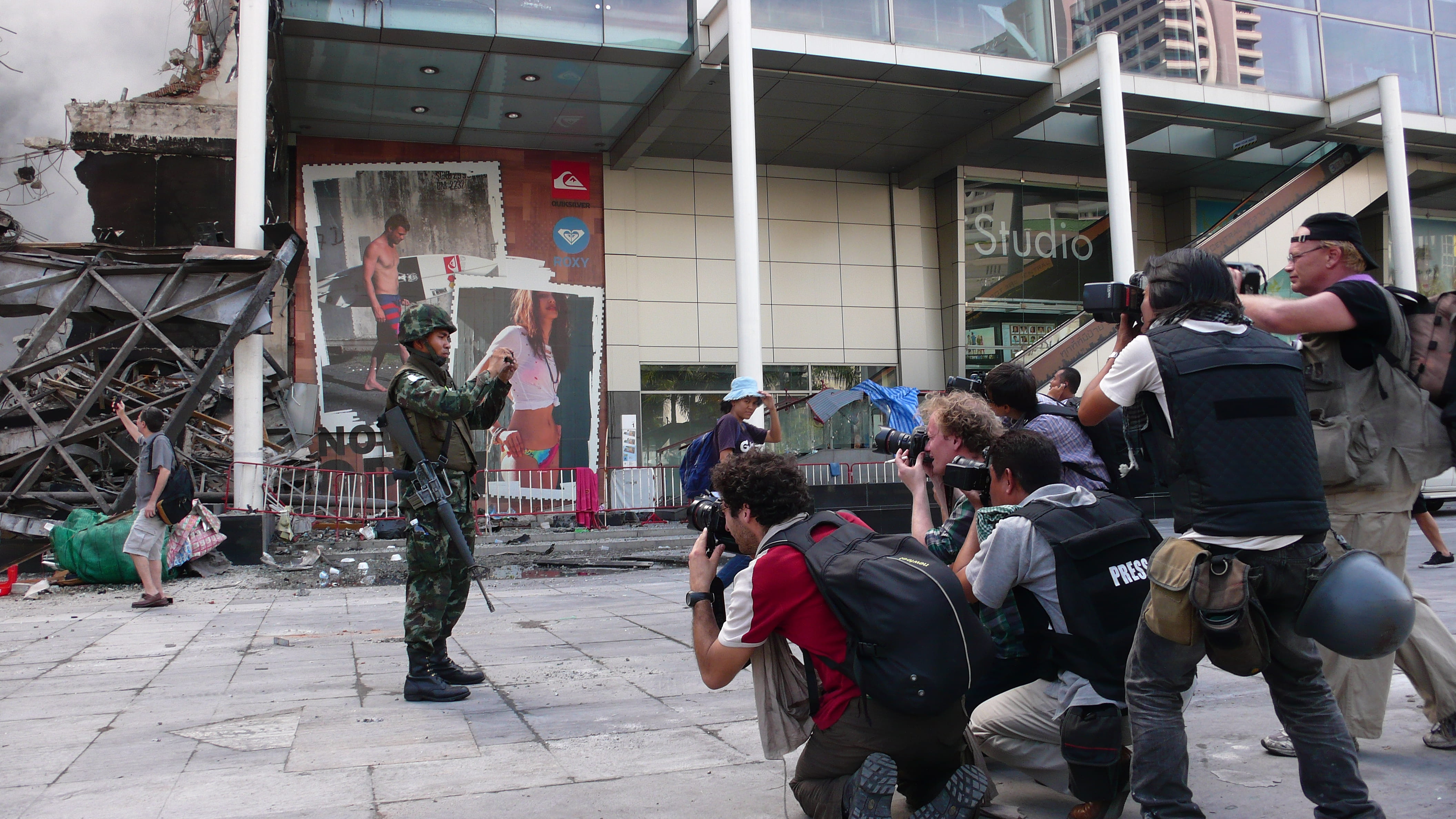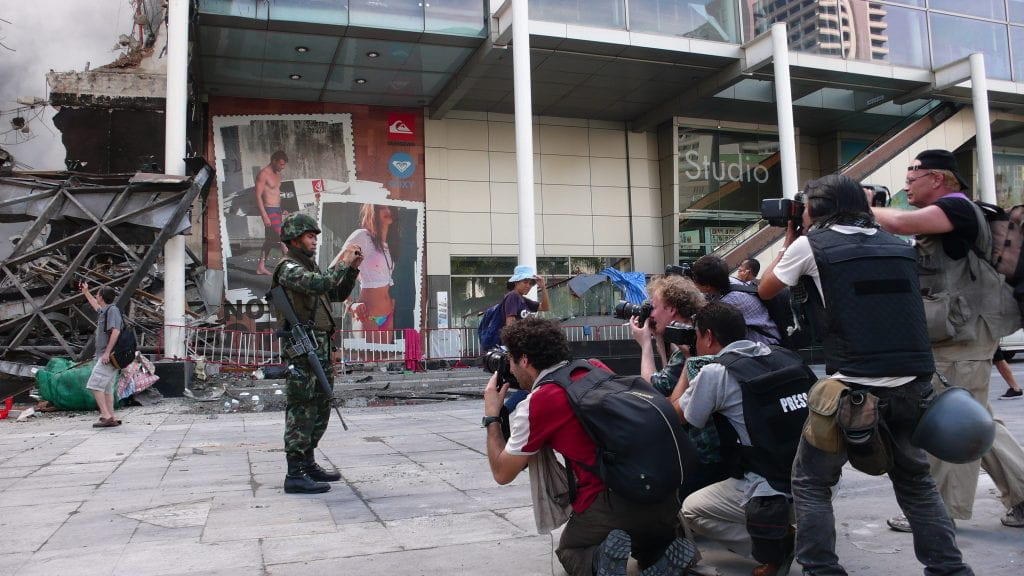by Andy Carr

To say American media has struggled in recent decades would be an understatement, but the past weeks of extensive newsroom layoffs cut especially deep. As CNN reported on January 24, from Monday to Thursday of that week, at least 1,000 journalists were laid off nationwide, including 15 percent of BuzzFeed News personnel (approximately 220 individuals), 7 percent of various Verizon-owned entities’ staff (including HuffPost, AOL, and Yahoo News), and widespread cuts at Gannett, America’s largest newspaper owner. At BuzzFeed News alone, the entire national news desk staff was gone by January 25, along with all but one of the LGBT-focused reporters at the company and the national security staff.
That devastating week’s news follows years of similar stories far beyond the present decade’s startups and digital innovators. Last spring, Sridhar Pappu and Jay Stowe of the New York Times provided a concise yet devastating account of the shifting media landscape since the dawn of the twenty-first century, including the collapse of marquee legacy publications like TIME magazine:
When Time Warner merged with AOL in 2000, the company seemed poised to conquer the internet. History, however, had other plans. Subscribers and advertisers turned away from the core publications. Budgets shrank. Layoffs became commonplace. In 2014, Time Inc. was spun off from the Time Warner mother ship, and in 2015 it left the Time & Life building for a comparatively modest space on Liberty Street in Lower Manhattan.
TIME, along with parent company Time Inc.’s other leading magazines, like Sports Illustrated, Fortune, and Money, had been purchased in fall 2017 by media conglomerate Meredith Corp., before putting the Time portfolio up for sale just six months later. Gannett, meanwhile, recently was described as “the most voracious acquirer of local papers in the news business,” publishing national outlets like USA Today and major-market papers “including The Arizona Republic, the Milwaukee Journal Sentinel, and The Cincinnati Enquirer.” Even Gannett is exposed to looming concerns: Alden Global Capital, a New York-based global hedge fund founded in 2007, offered a hostile bid to takeover Gannett for $1.4 billion. As The Week reported earlier in January,
[The] strategy of buying and cutting [media staff] is exactly the one that Gannett pursued as it grew into the biggest newspaper owner in the country. Alden is following Gannett’s own logic, taken to its furthest extreme. So far, wherever Digital First [Alden’s media subsidiary] has gone, ‘a bevy of job cuts’ has followed. [So, if] Alden succeeds in its bid, it will be a waking nightmare for anyone who cares about newspapers.
Many such stories have wrenched the field of journalism since the 1990s, and one need not look far back into archives to see the expansive damage. The Weekly Standard, a conservative outlet which in its waning months of operation “exhibited a cover-to-cover vibrancy that had eluded it for more than a decade,” was “snuffed” out of existence by owner Phil Anschutz last December; Glamour announced last November that the 80-year-old print version of the magazine would cease production, “shifting to a digital-only operation” after January 2019; international titles with U.S.-based parent organizations, like men’s magazine ShortList and Cosmopolitan Australia, also closed in 2018. Among America’s local and regional newspapers, the bludgeoning has proved even more draconian: approximately “1,800 local papers have closed or merged since 2004,” according to a 2018 CNN report.
As I wrote late last year, journalism—and journalists, individually—are linked inextricably to human rights concerns, as the “chroniclers” of human rights abuses, making them known to the world, as advocates and agents of human rights causes they cover, and as the targets of increasingly frequent abuses globally. The stunning decline of American news media broadly affects both deep-dive investigative journalism and analysis, along with on-the-ground reporting of current affairs. In so doing, these structural changes to the industry threaten journalism’s integral role in cataloging, reporting, and advancing human rights.

These systemic changes to the news media landscape often have been grouped into two broad categories: the overall consolidation of American mass media, among other industries, since the end of the twentieth century (a two-time subject of John Oliver’s Last Week Tonight, back in 2017), and the massive shift to mobile and online-based advertising, where aggregate revenue overwhelmingly is concentrated in leading digital companies like Facebook and Google. According to a 2018 estimate reported in Adweek, those two companies alone account for “around 85 percent of every new digital dollar” entering the mobile and online ad spaces. Facebook in particular already functions “as one of the world’s largest distributors of information,” a reality it “acknowledged” in early 2017 “by announcing the Facebook Journalism Project.” The Project “calls for the company to forge deeper ties with publishers,” to help “develop training programs and tools for journalists,” and to “help train members of the public to find news sources they trust, while fighting the spread of fake news across its site.” While Facebook had met with thousands of publishers by mid-year 2017; actual financial support, i.e., the transfer of advertising revenue streams or any other profit-generating opportunities, remain illusory, and outside the scope of Facebook’s efforts.
Clearly, American mass media faces several structural challenges, but why is any of this relevant for human rights-related concerns? Why is the labor crisis in journalism a human rights concern unto itself? The effects are manifold. First, media consolidation has been found to affect the “viewpoint diversity” of media broadly – meaning, consolidation might restrain the variety of views and issues covered in papers and online outlets. As early as 1999, the late Senator Paul Wellstone (D-MN) wrote about his concerns about the early stages of media consolidation as a threat to American democracy. In a Federal Communications Law Journal article, Sen. Wellstone expressed grave concerns about a then-pending merger of CBS and Viacom, among a “recent wave of mergers among media companies,” all of which might pose threats “for our representative democracy” and accordingly “warrant the highest level of scrutiny by … antitrust agencies” (p. 551). The Senator continued, presciently arguing that America’s media is not just any ordinary industry. It is the life-blood of American democracy. We depend on the media for the free flow of information that enables citizens to participate in the democratic process. As James Madison wrote in 1822, ‘A popular government without popular information, or the means of acquiring it, is but a prologue to a farce or a tragedy, or perhaps both.’ That’s why freedom of the press is enshrined in our Constitution. No other industry enjoys that kind of protection (p. 551-552).
Speaking of the media’s macro-role, Sen. Wellstone concluded that, for America’s “democracy to work, we depend on the media to do two things. We depend on them to provide citizens with access to a wide and diverse range of opinions, analyses, and perspectives” and, second, “we depend on the media to hold concentrated power—whether public or private power—accountable to the people” (p. 552). Thus, “greater diversity of ownership and control” confers superior ability among journalists “to perform those functions” which are so vital. The empirical record for that proposition, admittedly, is mixed – as a 2009 study by Daniel E. Ho and Kevin M. Quinn in the Stanford Law Review found twenty years after Sen. Wellstone’s article was published. (The question remains an open, hotly debated one, nonetheless, especially among legal scholars.)
Regardless of consolidation’s effects on viewpoints in journalism, the effects on reporters’ professional capabilities—to fulfill the democratic functions outlined by Sen. Wellstone and to highlight, in particular, human rights stories at home and around the world—are less ambiguous. On the one hand, the renewed implosion of the field has exposed journalists to protracted, targeted, organized abuse online, especially through social media attacks, which journalists have used to share job opportunities and freelance gigs during the cycles of layoffs, and just as often to provide support to or commiserate with former colleagues and other industry peers. As writer and journalist Maya Kosoff put it in a January 29 tweet, she was “overwhelmed by how helpful and supportive people have been [through Twitter] over the past week” of layoffs, and dedicated to finding ways “to pay it forward” to others in the field.
For present purposes, worries run deeper. As writer Rebecca Traister put it in a reflective tweet amid the layoff chaos in late January, it is difficult to “fathom the number of talented journalists being taken away from the work they were in the midst of doing this week. This is a travesty” – and a harbinger of what is to come in the event of further consolidations and layoffs. To take just one example, BuzzFeed News reporter Mike Giglio—among those who were laid off last month—produced extensive, in-depth stories during his more than five years with the company. His reporting on U.S. involvement in Syria regularly touched upon the complexities of both foreign policy stratagem and the dire concerns of civilians exposed to human rights abuses. Last fall, Mr. Giglio perceptively deconstructed the geopolitical morass of the Jamal Khashoggi killing, accounting for the crosscutting interests of Turkey, Iran, Saudi Arabia, and the U.S. with deeply reported interviews and analysis.
After the BuzzFeed News desk was effectively “demolished,” dozens of talented reporters and writers like Giglio are now forced into an unforgiving job market, sitting on dormant stories and leads. Similar stories at the abovementioned outlets reeling from layoffs—from HuffPo to AOL, Gannett to the more-recent purges at McClatchy—abound. The gutting of newsrooms around America is a profound pain for writers and their families, personally. But the ongoing thinning of journalism’s most-talented ranks undermines the whole public’s access to vital information needed to hold human rights abusers to account as well. The stakes are high.



